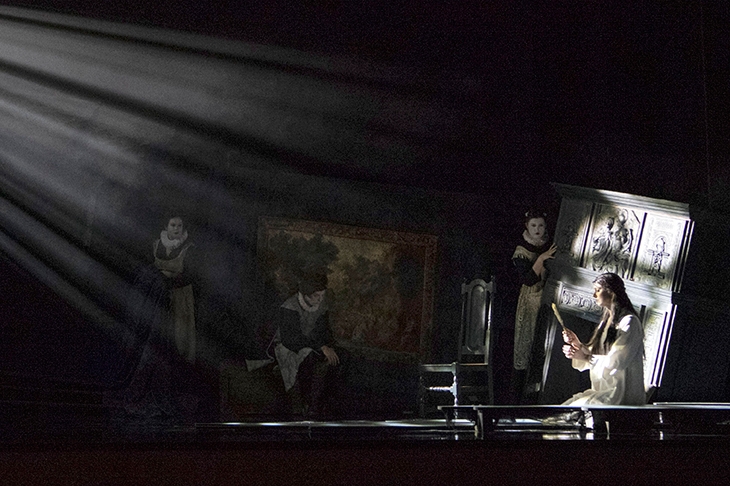Wolverhampton; Workington; Blackburn; Sheffield; Lancaster; Hackney. Every year English Touring Opera does what our national opera company doesn’t: packs up its props and takes to the road, bringing opera to the bits of the UK other companies don’t even think about reaching. And not just Traviatas and Toscas either, but properly interesting, often unusual, repertoire.
With a core staff you can pretty much count on your fingers, and ticket prices that would scarcely buy you a sandwich at the Royal Opera House, let alone a seat, the whole operation is one of those minor miracles of the arts world — a company where a little bit of funding goes an awfully long way, and not just geographically.
Then there’s the talent. ETO has had an eye for young singers since the beginning, and a look through past casts finds everyone, from Christopher Purves and Sarah Connolly, Susan Bickley and Amanda Echalaz, starting their careers with the company.
Which isn’t to say that everything ETO touches turns to gold. With fringe works come greater risks, and there are both hits and misses in its autumn season — an all-baroque pairing of Handel’s Radamisto and a triple bill of Purcell, Carissimi and Gesualdo, with semi-staged performances of Bach’s St Matthew Passion thrown in for good measure.
Headliner Radamisto is a solid, uncomplicated winner. The plot — warring families and nations in ancient Asia Minor — lends itself poorly to updating, and director James Conway’s decision to leave it be is a relief. As it is he nudges the action forward just a couple of centuries to the early days of Armenian Christianity, the jewel tones and gilding of whose art are the starting point for Adam Wiltshire’s handsome designs, which cope efficiently with a widescreen drama that demands battlements and cliff faces as well as palaces.
The real interest here, though, is musical. Peter Whelan conducts the period Old Street Band in a crisp, swift (and, yes, mercifully cut) version of Handel’s score, sensitive to his young singers, two fine horns adding their own sonic gilding. If countertenor Will Towers is a little woolly-toned in the title role of warrior Radamisto, it works for a drama in which it’s the women who really get things done. Ellie Laugharne’s softly lyrical Polissena (impeccably sung) conceals a steely core, her coolness a foil to the pulsing heat of Katie Bray as Zenobia, Radamisto’s wife — her coloratura arrow-sharp and just as deadly. Grant Doyle’s baddie Tiridate and tenor John-Colyn Gyeantey’s baddish Tigrane do the business more or less idiomatically, but it’s the women who power this production.
Purcell’s Dido and Aeneas is the centrepiece of the second evening. Framed by Carissimi’s Jonah and the whale oratorio Jonas and I Will Not Speak — a newly conceived sequence of poetry, narration, motets and madrigals inspired by infamous composer-murderer Carlo Gesualdo — it becomes the central panel in a rather ambiguous musical triptych, conceived by three different directors, but all conducted by Jonathan Peter Kenny. There’s faith here certainly, flickering as the candle flames that illuminate I Will Not Speak. But also violence and desire.
Much slighter than the composer’s better-known Jephte, Jonas is a radiant final chorus, a passionate musical prayer for the title character, and not a lot more (the whale is, disappointingly, silent). Director Bernadette Iglich plays the same games here that she did with Jephte back in 2006. Once again narration is divided between multiple soloists who wander absently around the stage throughout, all earth-toned linen and intense expressions. This sub-Peter Sellars approach (shared by the company’s St Matthew Passion) adds little, actively confusing the drama at times, apparently mistaking dim lighting and a lack of action for profundity. A strong central performance by Jorge Navarro-Colorado as Jonah is a redeeming feature.
James Conway’s I Will Not Speak is better. Verses by George Herbert and Saint John of the Cross are nicely spoken, a foil to the harmonic howls and ecstatic convulsions of Gesualdo’s still-confronting music, sung well here but missing the communicative energy and musical trust of a regular consort of collaborators. But the drama feels overextended, lacking the clarity of I Fagiolini’s Gesualdo theatre-piece Betrayal or the humanity of Sciarrino’s Gesualdo-inspired opera The Killing Flower.
Initial appearances suggest that Seb Harcombe’s Dido and Aeneas will be straighforwardly handsome (Wiltshire’s Jacobean set and costumes, artfully crumbling and askew, are a real treat). But Harcombe has other plans, peeling back the familiar music to reveal a psychodrama that hits you somewhere between heart and head. No powerful, mature queen this; Sky Ingram’s Dido is a volatile, neurotic woman-child, whose nemesis the Sorceress (a superb Frederick Long) is less a malign force than a dark alter ego. Susanna Fairbairn’s earthy Belinda tries to keep things on the rails, but the fragile resolution and alliance with Nicholas Mogg’s deliciously ineffectual Aeneas gradually implodes. A closing coup de théâtre is the final stab the show needs to tip it from artful to downright devastating.






Comments